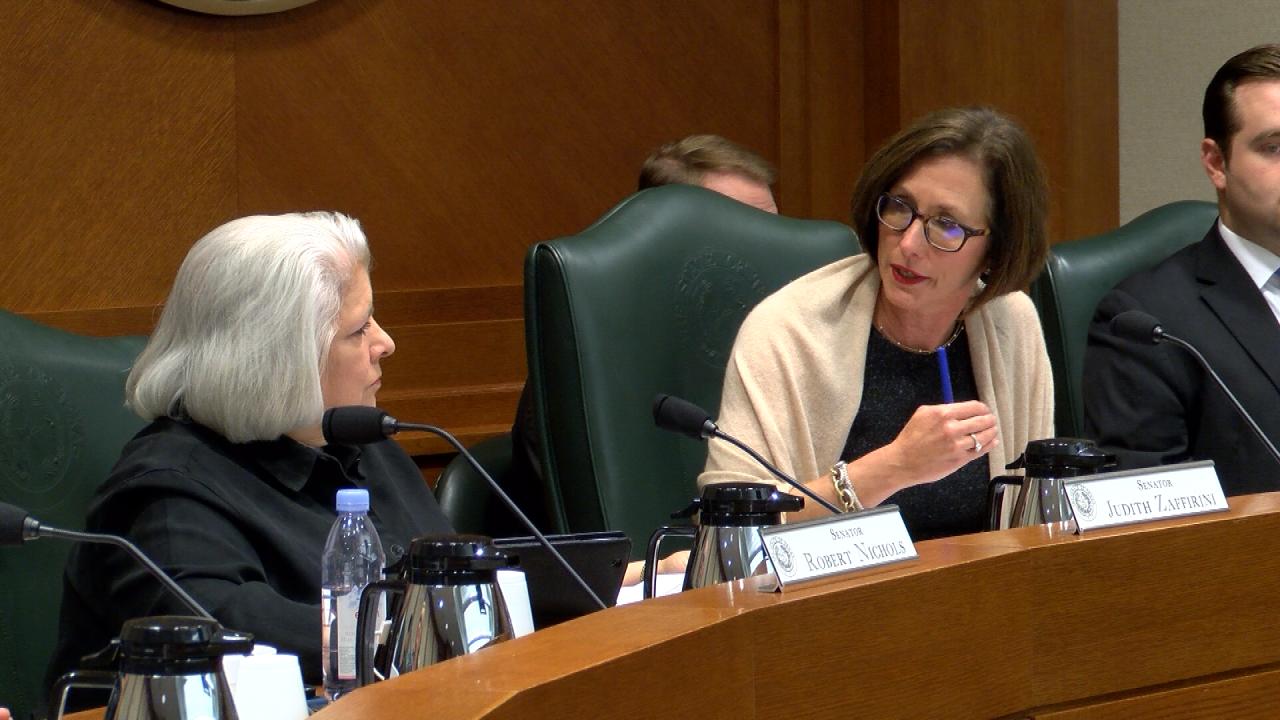After a wave of allegations against politicians across the country, including two Texas senators, the state Senate held a hearing to address the policies and procedures surrounding how the Legislature will handle reports of sexual harassment.
The Senate’s Administration committee hearing on Thursday follows a House Administration hearing at the beginning of the month, in an attempt to create clear guidelines for reporting inappropriate sexual behavior, and providing proper action once those reports are made.
Two people testified: Secretary of the Senate Patsy Spaw, and Delicia Sams, Director of Senate Human Resources.
Spaw said only one formal report of sexual harassment has been filed since 2001, which is something nearly everyone in the room agreed did not accurately represent how many people have felt harassed at the Texas State Capitol.
Sen. Lois Kolkhorst, R-Brenham, the chair of the committee said she knew of instances, “even in the last session,” where cases were reported to chiefs of staff and handled within the office, sometimes involving the senator when the cases were “staff-to-staff.”
“It was not a formal complaint that went to the Secretary of the Senate but it was a complaint that went to the chief of staff that was then able to be handled,” Kolkhorst said.
“Sexual harassment is wrong and let me stress again that the Texas Senate does not tolerate any form of sexual harassment and we will carefully investigate any report we receive,” she added.
Lt. Gov. Dan Patrick tasked Kolkhorst with addressing sexual harassment in the upper chamber.
In a statement last week, Patrick said he wanted “to be sure that we are doing all we can to make sure every staff member and every elected official is protected from sexual harassment and all other inappropriate behavior.”
Two Texas Senators, Borris Miles, D-Houston, and Carlos Uresti, D-San Antonio, have both been accused of sexual misconduct, including physical contact and suggestive remarks, according to an exposé by the Daily Beast. Both men denied the allegations, amid a call for their resignation by a left-leaning political organization in Texas.
Both Kolkhorst and Sen. Sylvia Garcia, D-Houston, who is not a member of the committee but joined the members at the dias and asked questions, declined to specifically address the allegations against their colleagues, but they did say the issues do need to be addressed.
“We just need to make sure that there is a process in place and that women, and men, or anyone who feels they have been discriminated against, bullied, sexually harassed, or sexually abused, knows that this is a safe working environment,” Garcia explained. “Not one [victim of recent harassment] came to us, so there has got to be a flaw in our system if people feel more free to talk to the press than they do to us.”
The Senate has had a policy on the books since 1995, and part of Thursday’s meeting was learning from Spaw and Sams about how sexual harassment training and other elements of the policies and procedures are handled, as well as identify preventative measures.
“We are looking to try to prevent any of these actions that would make any employee, staffer, or staff to staff, feel uncomfortable,” Kolkhorst said.
Spaw explained that only some of the central Capitol offices, including Patrick’s office, participate in sexual harassment training, though other members and their staffs perform their own educational measures independently. Those trainings are generally held every other year. The committee members talked about creating a mandatory training for all staff, including senators.
“We are also looking at the possibility of making it a requirement for all senators and making it a requirement for all Senate staff, and that would include district employees,” Kolkhorst mentioned. She said that she believed that the Texas Senate was ahead of the curve nationally, but reinforced that the policies could be outlined more clearly in writing.
“There are many governance structures [in place] but maybe it is not spelled out as clearly as it should be in our handbook, and so I thought that was an excellent point today,” she stated.
Laredo Democrat Judith Zaffirini said she hoped by updating the guidelines, “more victims be emboldened to come forth and help us eliminate this degrading behavior.”
“Sexual harassment has no place at the Capitol period,” Zaffirini added.
Sen. Robert Nichols, R-Jacksonville, told the committee he had a “frank” conversation with his staff about coming forward with observations of unsavory behavior. “The attitude starts with the members,” Nichols said.
Sen. Bryan Hughes, R-Mineola, said he wanted to ensure “due process” for both the accuser and the accused.
“I look forward to working with my colleagues to making sure we’re on the right track,” Hughes stated in opening remarks.
All present members agreed coming up with a more overarching plan, rather than different trainings and policies for different people, would lead to a more successful and comfortable situation.
Meanwhile, the House adopted a new set of policies outlining terms and definitions that also includes sexual harassment training requirements.
“This was an area where, frankly, the legislature needed to do better,” outgoing House Speaker Joe Straus told reporters at a luncheon on Wednesday.
“We are having what would be considered mandatory training,” Straus said. “We do have in place a system now that was long overdue.”
He said he would also be participating in the training exercises, so that all members of the Legislature know how to deal with the issues when they arise and how to handle it.
“They will have to help there,” Straus continued. “Everything from knowing how to report these incidents to getting counseling, if necessary, and I think it will be very helpful and necessary thing that is long overdue.”
The hearing can be viewed here.
Note: The original article was updated to reflect comments from the hearing.











